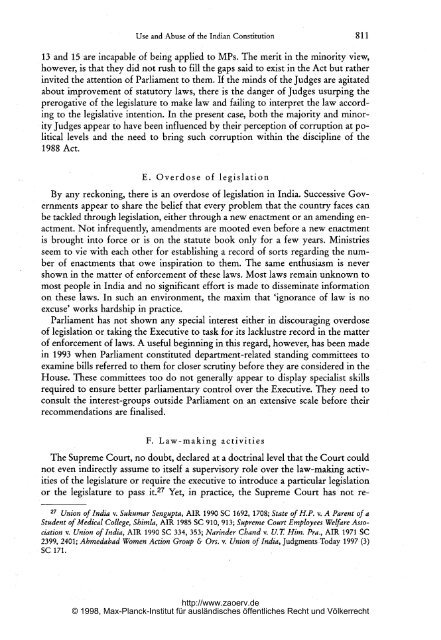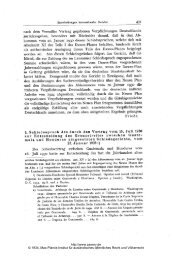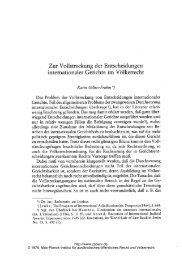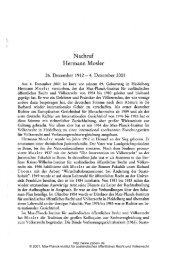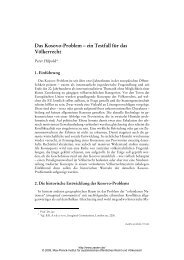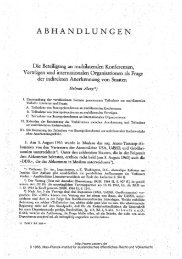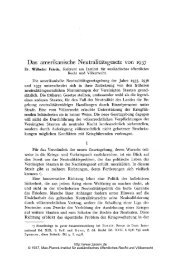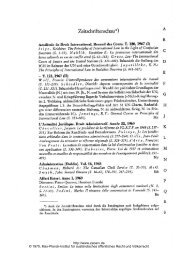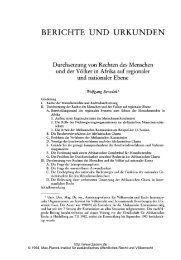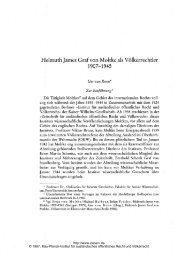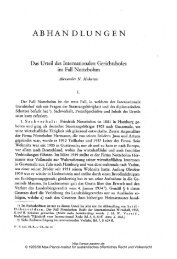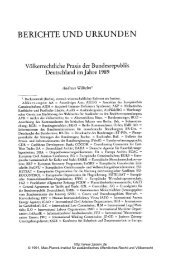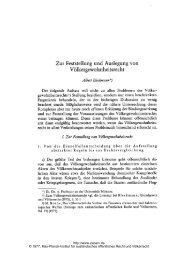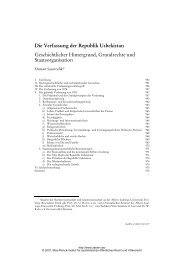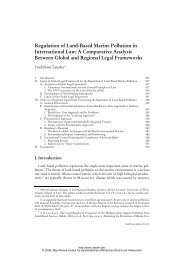810 Raounder section .19(1) <strong>of</strong> <strong>the</strong> Act. The minority Judges (Bharucha <strong>and</strong> Rajendra BabuJJ.) held that MPs cannot be prosecuted for <strong>the</strong> <strong>of</strong>fences mentioned in section19(l), namely <strong>the</strong> <strong>of</strong>fences punishable under sections 7, 10, 11, 13 <strong>and</strong> 15 <strong>of</strong> <strong>the</strong>1988 Act because <strong>of</strong> want <strong>of</strong> an authority competent to grant sanction <strong>the</strong>reto, <strong>and</strong>expressed <strong>the</strong> hope that Parliament will address itself to <strong>the</strong> task <strong>of</strong> removing thislacuna with due expedition. They, however, held that sanction is not required inrespect <strong>of</strong> <strong>of</strong>fences not expressly specified in section 19(l). It appears that <strong>the</strong> minorityjudges are referring here to <strong>the</strong> <strong>of</strong>fences punishable under sections 8 <strong>and</strong> 9in respect <strong>of</strong> which no sanction is required under section 19. The majority judges(Agarwal, An<strong>and</strong> <strong>and</strong> Ray JJ.) declared that, since <strong>the</strong>re is no authority competentto remove a member <strong>of</strong> Parliament <strong>and</strong> to grant sanction for his prosecution undersection 19(l), <strong>the</strong>re is no limitation on <strong>the</strong> power <strong>of</strong> <strong>the</strong> Court to take cognisance,under section 190 <strong>of</strong> <strong>the</strong> Code <strong>of</strong> Criminal Procedure, <strong>of</strong> <strong>the</strong> <strong>of</strong>fences mentionedin section 19(l) <strong>of</strong> <strong>the</strong> 1988 Act. They observed that <strong>the</strong> requirement<strong>of</strong> sanctionunder section 19(l) is intended as a safeguard against criminal prosecution <strong>of</strong> apublic servant on <strong>the</strong> basis <strong>of</strong> malicious or frivolous allegations by interestedpersons <strong>and</strong> that <strong>the</strong> inapplicability <strong>of</strong> section 19(1) to a member <strong>of</strong> Parliament"would only mean that <strong>the</strong> intended safeguard was not intended to be made availableto him.-25 They expressed <strong>the</strong> hope that Parliament will provide for an adequate-safeguard in this regard by making suitable amendment to <strong>the</strong> 1988 Act.However, <strong>the</strong>y held that, till such safeguard is provided by Parliament, <strong>the</strong> prosecutingagency, before filing a charge-sheet in respect Of <strong>of</strong>fences Punishable undersections 7, 10, 11, 13 <strong>and</strong> 15 <strong>of</strong> <strong>the</strong> 1988 Act against a member <strong>of</strong> Parliament in acriminal court, shall obtain <strong>the</strong> permission <strong>of</strong> <strong>the</strong> Chairman <strong>of</strong> <strong>the</strong> Rajya Sabha/-Speaker <strong>of</strong> <strong>the</strong> Lok Sabha, as <strong>the</strong> casemay be.The Court's view that <strong>the</strong> 1988 Act applies to MPs does not appear to be sound.If <strong>the</strong> Act intended to apply to MPs, <strong>the</strong>re is no reason why it would not haveprovided for <strong>the</strong> requirement <strong>of</strong> previous sanction in <strong>the</strong> case <strong>of</strong> MPs too. Theview <strong>of</strong> <strong>the</strong> majority judges that this safeguard was not intended to be made availableto a member <strong>of</strong> Parliament appears to be faulty, for it is inconceivable thatParliament which enacted <strong>the</strong> 1988 Act would have deemed it appropriate not tomake such safeguard available to its members, while making <strong>the</strong> same available too<strong>the</strong>r public servants.26 If that were <strong>the</strong> intention, as held by <strong>the</strong> majority judges,<strong>the</strong>n how could <strong>the</strong> Supreme Court create <strong>the</strong> safeguard on its own, <strong>the</strong>reby makinglegislation <strong>of</strong> its own contrary to <strong>the</strong> scheme <strong>of</strong> <strong>the</strong> 1988 Act. Even <strong>the</strong> view<strong>of</strong> <strong>the</strong> minority judges that MPs can be prosecuted under <strong>the</strong> 1988 Act for <strong>of</strong>fencesnot mentioned in section 19 appears to be faulty, for it is illogical to contendthat <strong>the</strong> Act, while making provision for prosecution <strong>of</strong> MPs for <strong>of</strong>fencesunder sections 8 <strong>and</strong> 9, intended to distance <strong>the</strong> MPs from <strong>the</strong> more significant <strong>of</strong>fencesspecified in section 19; it cannot also be contended that sections 7, 10, 11,25 P V Narasimba Rao v. State (note 15), at 104.26 See also Verm a, J.'s dissenting judgment in Veeraswami's case, 1991 (3) Supreme Court Reporter(SCR) 189, 285, 286.http://www.zaoerv.de© 1998, Max-Planck-Institut für ausländisches öffentliches Recht und Völkerrecht
Use <strong>and</strong> <strong>Abuse</strong> <strong>of</strong> <strong>the</strong> <strong>Indian</strong> Constitution 81113 <strong>and</strong> 15 are incapable <strong>of</strong> being applied to MPs. The merit in <strong>the</strong> minority view,however, is that <strong>the</strong>y did not rush to fill <strong>the</strong> gaps said to exist in <strong>the</strong> Act but ra<strong>the</strong>rinvited <strong>the</strong> attention <strong>of</strong> Parliament to <strong>the</strong>m. If <strong>the</strong> minds <strong>of</strong> <strong>the</strong> judges are agitatedabout improvement <strong>of</strong> statutory laws, <strong>the</strong>re is <strong>the</strong> danger <strong>of</strong> judges usurping <strong>the</strong>prerogative <strong>of</strong> <strong>the</strong> legislature to make law <strong>and</strong> failing to interpret <strong>the</strong> law accordingto <strong>the</strong> legislative intention. In <strong>the</strong> present case, both -<strong>the</strong> majority <strong>and</strong> minorityjudges appear to have been influenced by <strong>the</strong>ir perception <strong>of</strong> corruption at politicallevels <strong>and</strong> <strong>the</strong> need to bring such corruption within <strong>the</strong> discipline <strong>of</strong> <strong>the</strong>1988 Act.By any reckoning,E. Overdose <strong>of</strong> legislation<strong>the</strong>re is anoverdose <strong>of</strong> legislation in India. Successive Governmentsappear to share <strong>the</strong> belief that every problem that <strong>the</strong> country faces canbe tackled through legislation, ei<strong>the</strong>r through a new enactment or an amending enactment.Not infrequently, amendments are mooted even before a new enactmentis brought into force or is on <strong>the</strong> statute book only for a few years. Ministriesseem to vie with each o<strong>the</strong>r for establishing a record <strong>of</strong> sorts regarding <strong>the</strong> number<strong>of</strong> enactments that owe inspiration to <strong>the</strong>m. The same enthusiasm is nevershown in <strong>the</strong> matter <strong>of</strong> enforcement <strong>of</strong> <strong>the</strong>se laws. Most laws remain unknown tomost people in India <strong>and</strong> no significant effort ismade to disseminate informationon <strong>the</strong>se laws. In such an environment, <strong>the</strong> maxim that 'ignorance <strong>of</strong> law is noexcuse' works hardship in practice.Parliament has not shown any special interest ei<strong>the</strong>r in discouraging overdose<strong>of</strong> legislation or taking <strong>the</strong> Executive to task for its lacklustre record in <strong>the</strong> matter<strong>of</strong> enforcement <strong>of</strong> laws. A useful beginning in this regard, however, has been madein 1993 when Parliament constituted department-related st<strong>and</strong>ing committees toexamine bills referred to <strong>the</strong>m for closer scrutiny before <strong>the</strong>y are considered in <strong>the</strong>House. These committees too do not generally appear to display specialist skillsrequired to ensure better parliamentary control over <strong>the</strong> Executive. Theyconsult <strong>the</strong> interest-groupsrecommendations are finalised.need tooutside Parliament on an extensive scale before <strong>the</strong>irF. Law-making activitiesThe Supreme Court, no doubt, declared at a doctrinal level that <strong>the</strong> Court couldnot even indirectly assume to itself a supervisory role over <strong>the</strong> law-making activities<strong>of</strong> <strong>the</strong> legislature or require <strong>the</strong> executive to introduce a particular legislationor <strong>the</strong> legislature to pass it.27 Yet, in practice, <strong>the</strong> Supreme Court has not re-27 Union <strong>of</strong> India v. Sukumar Sengupta, AIR 1990 SC 1692, 1708; State <strong>of</strong> H.P. v. A Parent <strong>of</strong> aStudent <strong>of</strong> Medical College, ShimLa, AIR 1985 SC 910, 913; Supreme Court Employees Welfare Associationv. Union <strong>of</strong> India, AIR 1990 SC 334, 353; Narinder Cb<strong>and</strong> v. U. T Him. Pra., AIR 1971 SC2399, 2401; Ahmedabad Women Action Group & Ors. v. Union <strong>of</strong> India, judgments Today 1997 (3)SC 171.http://www.zaoerv.de© 1998, Max-Planck-Institut für ausländisches öffentliches Recht und Völkerrecht


